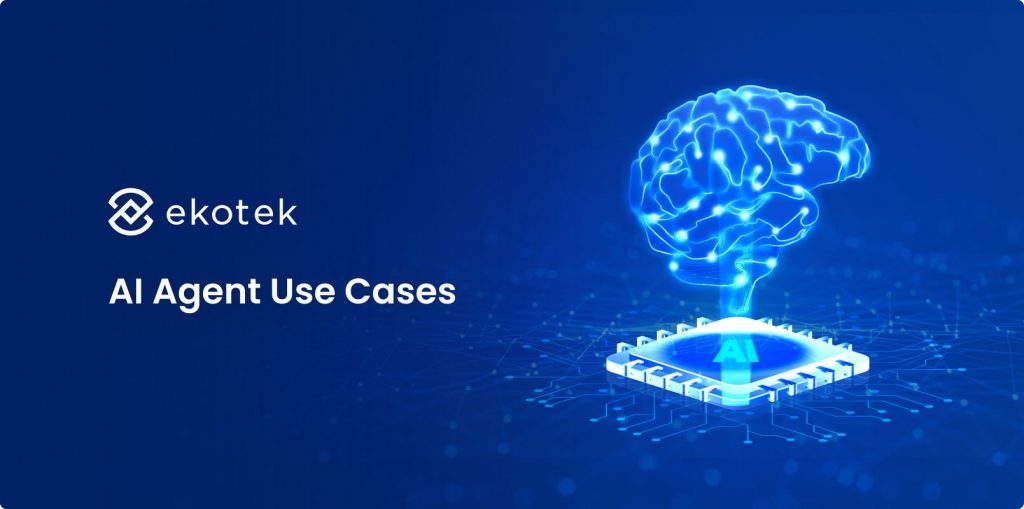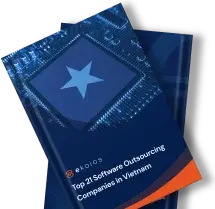Introduction
In 2025, the business landscape is witnessing an unprecedented transformation driven by AI agent use cases. As organizations strive for agility, automation, and a competitive edge, artificial intelligence agents are rapidly emerging as force multipliers across industries. AI agents, software powered by sophisticated algorithms, are now central to evolving strategies and digital transformation initiatives, unlocking value in ways that were unimaginable just a few years ago.
This article explores the leading AI agent innovations reshaping the enterprise, provides actionable guidance for leveraging these technologies, and offers a credible look at how industry leaders like Ekotek drive high-impact outcomes for clients globally. Whether you are a C-suite executive, innovation manager, or a digital transformation strategist, understanding the business-critical AI agent use cases will position your organization for long-term growth.
What Are AI Agents?
An AI agent is a program or system capable of perceiving its environment, making decisions, and taking action to achieve specific goals, often with a level of autonomy and adaptability unmatched by traditional software. Powered by machine learning, automation, and emerging AI agent platforms, these intelligent agents can navigate complex scenarios, handle repetitive tasks, and continually learn as they interact with users and systems.
Key Technologies Behind AI Agents
- Machine learning models for pattern recognition and prediction
- NLP (Natural Language Processing) enabling conversational and text-based interfaces
- Cognitive automation and robotic process automation (RPA) for task orchestration
- Multi-agent system architectures for large-scale, distributed problem-solving
Top 20 AI Agent Use Cases Across Industries
Customer services and sales
 1. Virtual Customer Support Agents
1. Virtual Customer Support Agents
AI agents integrate with CRM and knowledge bases to handle customer inquiries via chat, email, or voice. They understand intent, fetch answers, guide troubleshooting, and escalate complex cases to human agents.
Benefits:
-
Provide 24/7 support without extra staffing.
-
Reduce ticket volume by up to 70%, cutting costs.
-
Ensure consistent, accurate responses across channels.
-
Free human agents to focus on high-value or sensitive issues.
⭐️ Enterprises gain a competitive edge with LLM chatbots in customer engagement
2. Lead Qualification & Sales Outreach
AI agents scan incoming leads, assess behavior (site visits, email engagement, past purchases), and assign a “fit score.” They can also automate first contact with prospects, personalize messaging, and schedule meetings.
Benefits:
- Shortens the sales cycle by prioritizing hot leads.
- Increases conversion rates through personalized engagement.
- Saves sales teams hours of manual prospecting and cold calling.
3. Customer Retention & Churn Prevention
AI agents monitor customer usage, purchase frequency, or support tickets to detect signals of dissatisfaction or reduced activity. They can trigger proactive outreach, loyalty rewards, or personalized offers.
Benefits:
- Reduce churn rates through early intervention.
- Increase customer lifetime value with targeted retention strategies.
- Shift from reactive problem-solving to proactive relationship building.
Supply Chain & Logistics
4. Inventory & Stock Replenishment Agents
AI agents analyze historical sales, seasonal demand, and external factors (e.g., promotions, market trends) to forecast demand. They monitor inventory levels in real time and automatically trigger replenishment orders when stock is low.
Benefits:
- Avoid costly stockouts or overstocking.
- Reduce carrying costs by keeping optimal inventory levels.
- Improve demand forecasting accuracy with predictive analytics.
- Ensure consistent product availability for customers.
5. Shipment Tracking & Logistics Coordination
Connected to IoT sensors, GPS trackers, and ERP systems, AI agents provide real-time visibility of shipments. If a disruption is detected, like a delayed vessel or bad weather, they can proactively reroute shipments, alert stakeholders, and update delivery ETAs.
Benefits:
- Enable end-to-end shipment visibility for customers and managers.
- Reduce delays and improve reliability of deliveries.
- Automate alerts and exception handling, minimizing manual intervention.
- Strengthen customer trust with transparent updates.
6. Procurement & Vendor Management
AI agents evaluate supplier performance, compare vendor bids, track contract compliance, and detect invoice irregularities. They can also automate purchase order creation and approvals.
Benefits:
- Save procurement teams hours of manual evaluation.
- Reduce procurement fraud and ensure compliance.
- Improve supplier selection through data-driven insights.
- Speed up sourcing decisions and vendor onboarding.
⭐️ Discover why Agentic AI outperforms Traditional AI
Finance & Accounting
 7. Automated Invoice Processing
7. Automated Invoice Processing
AI agents use Optical Character Recognition (OCR) and Natural Language Processing (NLP) to extract data from invoices, validate them against purchase orders and contracts, and route them for approval or payment.
Benefits:
- Eliminate manual data entry and reduce human error.
- Speed up payment cycles, improving supplier relationships.
- Lower processing costs by automating high-volume workflows.
- Improve financial accuracy and audit readiness.
8. Financial Forecasting & Budgeting
AI agents analyze historical financial data, market trends, and business performance metrics to generate accurate forecasts. They can also recommend budget reallocations based on real-time changes.
Benefits:
- Deliver more accurate and timely forecasts.
- Support agile financial planning with real-time scenario analysis.
- Help finance leaders spot risks or opportunities earlier.
- Enable data-driven decision-making at the executive level.
9. Compliance & Risk Monitoring
AI agents continuously monitor transactions, contracts, and regulatory updates. They flag anomalies such as duplicate payments, fraudulent activity, or contract clauses that could create compliance risks.
Benefits:
- Reduce the cost of compliance monitoring.
- Minimize financial and reputational risk from fraud or errors.
- Keep pace with changing regulations through automated updates.
- Provide real-time alerts for faster corrective action.
⭐️ Unlock the future of banking with digital transformation insights
Human Resources
10. Employee Service Desk
AI agents act as a virtual HR helpdesk, answering routine employee queries on benefits, payroll, leave policies, or compliance guidelines. They connect with HRIS (Human Resource Information Systems) to fetch real-time information.
Benefits:
- Provide instant, 24/7 answers to employees.
- Reduce HR team workload by automating common queries.
- Improve employee satisfaction with faster response times.
- Standardize information to avoid inconsistent communication.
11. Recruitment Screening Agents
AI agents scan resumes, match candidate profiles against job descriptions, and conduct automated pre-screening (e.g., chat-based Q&A or skill assessments). They rank candidates based on fit and forward only qualified profiles to recruiters.
Benefits:
- Shorten hiring cycles by automating resume screening.
- Reduce bias with consistent evaluation criteria.
- Allow recruiters to spend more time engaging top candidates.
- Improve quality of hires with data-driven candidate scoring.
12. Onboarding Assistants
AI agents guide new hires through onboarding steps such as filling out documents, completing training modules, and setting up IT access. They also act as personal assistants for the first weeks of employment.
Benefits:
- Accelerate time-to-productivity for new employees.
- Ensure all compliance and training requirements are completed.
- Provide a personalized onboarding experience at scale.
- Reduce administrative burden on HR teams.
Manufacturing
 13. Predictive Maintenance Agents
13. Predictive Maintenance Agents
AI agents monitor machine data (temperature, vibration, energy usage) to detect early warning signs of equipment failure. They can schedule maintenance automatically before breakdowns occur.
Benefits:
- Reduce unplanned downtime and production delays.
- Lower maintenance costs by replacing parts only when needed.
- Extend equipment lifespan with proactive care.
- Improve workplace safety by preventing critical failures.
⭐️ Discover the key benefits of digital transformation in manufacturing
14. Production Planning & Scheduling Agents
AI agents analyze demand forecasts, inventory levels, and workforce availability to generate optimized production schedules. They dynamically adjust plans when disruptions occur.
Benefits:
- Increase factory efficiency with better resource allocation.
- Minimize bottlenecks and idle time in production lines
- Enable faster response to changes in demand or supply.
- Reduce operational costs through smarter scheduling.
Ekotek has already brought this vision to life for a global footwear manufacturer struggling with the complexity of creating Bills of Materials (BOMs) across thousands of product designs. We developed an AI agent powered by Computer Vision and NLP that can read technical shoe drawings, parse supplier documents, and automatically generate accurate BOM files. The result? Faster workflows, fewer errors, and major productivity gains for teams across multiple factories.
👉 See the full case study on AI-powered automation in manufacturing
15. Quality Control & Inspection Agents
AI agents use computer vision and sensors to inspect products on the assembly line. They detect defects in real time, flagging issues before items move downstream.
Benefits:
- Improve product quality by catching defects early.
- Reduce waste and rework costs.
- Maintain compliance with industry standards and regulations.
- Protect brand reputation by minimizing defective shipments.
Marketing & Content
Content Creation & Personalization
AI agents generate tailored content, from blog posts and product descriptions to personalized email campaigns, based on customer data, preferences, and behaviors. They can adapt tone and format for different channels and audiences.
Benefits:
- Produce content faster without increasing headcount.
- Improve engagement through hyper-personalized messaging.
- Scale content production for global markets and multiple platforms.
- Free marketing teams to focus on strategy and creativity.
Market Intelligence Agents
These agents continuously scan competitor websites, customer reviews, and social media channels. They aggregate and analyze data to provide insights into competitor pricing, market trends, and consumer sentiment.
Benefits:
- Give marketers real-time visibility into competitive moves.
- Support faster decision-making on pricing, positioning, and campaigns.
- Identify emerging opportunities and risks early.
- Reduce manual research time with automated monitoring.
Campaign Performance Optimization
AI agents monitor marketing campaigns across channels (Google Ads, social, email) in real time. They automatically adjust bidding strategies, reallocate budgets, and refine audience targeting to maximize ROI.
Benefits:
- Improve marketing ROI with continuous optimization.
- Eliminate wasted ad spend through smarter allocation.
- Achieve higher conversion rates with better targeting.
- Provide marketing teams with actionable insights instantly.
Healthcare & Life Sciences
Clinical & Administrative Support Agents
AI agents handle scheduling, patient intake, medical coding, and electronic health record (EHR) updates. They integrate with hospital management systems to automate routine administrative tasks.
Benefits:
- Reduce administrative workload for clinicians and staff.
- Improve accuracy in medical coding and record keeping.
- Shorten patient wait times through faster scheduling.
- Lower operational costs by automating repetitive tasks.
Patient Engagement Agents
AI agents act as digital health assistants, sending personalized reminders for medications, follow-up appointments, or wellness check-ins. They also provide educational resources and track patient-reported data.
Benefits:
- Increase treatment adherence with timely reminders.
- Improve patient outcomes through consistent follow-up.
- Enhance patient satisfaction with personalized care.
- Support population health management at scale.
How to Build an AI Agent: A 5-Step Guide
 While AI agents deliver enormous value, developing them in-house can be complex, requiring expertise in AI/ML, data engineering, integrations, and domain knowledge. For many enterprises, outsourcing AI agent development is the fastest and safest path.
While AI agents deliver enormous value, developing them in-house can be complex, requiring expertise in AI/ML, data engineering, integrations, and domain knowledge. For many enterprises, outsourcing AI agent development is the fastest and safest path.
⭐️ Check out our list of top AI agent development companies
Here are the five essential steps to creating an AI agent:
Step 1: Define Business Goals & Use Case
-
Identify the specific process or challenge you want to solve (e.g., customer support automation, inventory forecasting).
-
Set measurable KPIs such as reduced response time, cost savings, or improved accuracy.
Step 2: Gather & Prepare Data
-
Collect the datasets required to train or feed the agent (CRM records, transaction logs, IoT sensor data, etc.).
-
Ensure data quality, security, and compliance with regulations like GDPR or HIPAA.
Step 3: Choose the Right Technology Stack
-
Select frameworks and platforms for NLP, machine learning, integrations, and deployment.
-
Decide whether to use off-the-shelf solutions, cloud AI services, or build fully custom.
Step 4: Design, Train & Integrate the Agent
-
Define workflows and decision logic the agent should follow.
-
Train the model on relevant data, then connect it with enterprise systems (ERP, CRM, HRIS, etc.).
-
Run simulations and pilot tests before going live.
Step 5: Deploy, Monitor & Continuously Improve
-
Launch the AI agent in a controlled environment.
-
Monitor performance against KPIs and gather user feedback.
-
Continuously retrain and optimize for higher accuracy and adaptability.
⭐️ Learn exactly how to create an AI agent for your business
Future Trends: Strategic Outlook for AI Agents
Upcoming Technologies Shaping the Future
-
Generative AI for advanced content and decision support
Future AI agents won’t just respond—they’ll create. Generative AI allows agents to draft contracts, generate marketing campaigns, design supply chain scenarios, or simulate business strategies. For enterprises, this means faster ideation and reduced dependence on manual processes.
⭐️ Get your free guide to generative AI use cases in business
-
Explainable AI (XAI) to build trust and transparency
As AI agents make critical decisions (e.g., approving a loan, prioritizing patients, or detecting fraud), stakeholders will demand to know why. Explainable AI ensures decisions are traceable, auditable, and aligned with company policies—essential for regulatory compliance and executive trust. -
Autonomous multi-agent systems
Instead of a single AI agent working in isolation, the future will see multiple agents collaborating across business units. For example, a procurement agent, logistics agent, and finance agent could coordinate automatically to optimize end-to-end supply chain efficiency.
Anticipated Challenges
-
AI ethics and bias management
AI agents learn from historical data, which can contain hidden biases. Left unchecked, this can lead to unfair decisions (e.g., in hiring or lending). Companies must implement fairness audits and ethical frameworks to ensure equitable outcomes. -
Regulatory compliance and data privacy
Governments are tightening AI regulations (EU AI Act, data protection laws). Enterprises will need to design AI agents with compliance baked in—managing data residency, audit trails, and consent at scale. -
Workforce readiness for AI augmentation
As AI agents take over repetitive tasks, employees will need reskilling to focus on higher-value work. Change management programs will be critical to avoid resistance and ensure AI adoption delivers ROI.
Opportunities on the Horizon
-
AI in low-code and no-code platforms
The future of AI agents isn’t limited to data scientists. Low-code platforms will allow business users themselves to configure and deploy AI agents—democratizing innovation and reducing dependency on IT. -
Cross-industry collaboration on open standards
Interoperability will become vital. Shared standards will allow AI agents in healthcare, logistics, or finance to communicate across ecosystems, enabling smoother integrations and partnerships. -
Ecosystem-driven innovation
Leading enterprises won’t just adopt AI agents—they’ll build ecosystems around them. This includes partnerships with technology vendors, startups, and academic research, creating continuous innovation pipelines instead of isolated deployments.
Ekotek’s AI Development Services
Ekotek designs solutions that solve real business challenges and create measurable impact. Our development services span across the full spectrum of AI technologies, giving enterprises the flexibility to innovate at scale.
-
Computer Vision Solutions: From facial recognition and video analytics to OCR and action recognition, we deliver vision-based AI that enhances efficiency in areas such as manufacturing, security, and retail. Our expertise also extends to image generation using advanced models like GANs and Stable Diffusion.
-
Natural Language Processing (NLP): We design AI agents and chatbots that enable seamless customer interactions, build multilingual translation tools for global enterprises, and provide sentiment analysis systems to help companies better understand and act on customer feedback.
-
Data Analytics & Intelligence: Our services cover the full data lifecycle, from collection and preparation to real-time monitoring and predictive modeling. These solutions give decision makers the insights they need to anticipate trends, manage risks, and make faster, more informed decisions.
-
Recommendation Systems: Whether for e-commerce, media, or social platforms, we develop algorithms that personalize user experiences by suggesting products, content, or connections that truly resonate with customer preferences.
-
Generative AI Applications: We harness the power of LLMs, RAG, and generative models to build intelligent assistants, coding copilots, and creative tools. Our solutions support everything from advertising and marketing automation to CAD model generation, helping businesses scale both productivity and creativity.
⭐️ Transform your business with Ekotek’s end-to-end AI development services
Conclusion: The Strategic Imperative of AI Agent Adoption
AI agents are already reshaping industries from customer service to logistics, finance, HR, manufacturing, marketing, and healthcare. By automating repetitive tasks, providing real-time intelligence, and enhancing decision-making, they help businesses achieve efficiency, resilience, and long-term growth. Organizations that embrace AI agents today will be better prepared to compete in tomorrow’s digital economy.
Ekotek combines deep technical expertise, cross-industry experience, and a proven development process to deliver AI solutions that truly make an impact. From computer vision to generative AI, from natural language processing to data analytics, our team builds and integrates AI agents tailored to your business goals. We offer flexible engagement models, whether you need a dedicated AI development partner or team extension, to ensure speed, scalability, and cost-effectiveness. If you’re ready to transform your operations and stay ahead of the curve, partner with Ekotek to bring your AI vision to life.
FAQ on AI agent use cases
1. What is the difference between AI agents and traditional automation tools?
AI agents go beyond rule-based automation by using machine learning, natural language processing, and decision-making capabilities. Unlike traditional bots, they can adapt to changing inputs, learn from data, and operate across multiple business systems.
2. How can AI agents add value to my business?
AI agents reduce operational costs by automating repetitive tasks, improve decision-making with real-time insights, and enhance customer experiences through personalization. For enterprises, this means higher efficiency, greater scalability, and a stronger competitive advantage.
3. Are AI agents secure and compliant with regulations?
Yes. With proper design, AI agents can follow enterprise-grade security standards and comply with industry regulations like GDPR or HIPAA. A trusted partner like Ekotek ensures data privacy, model transparency, and robust monitoring.
4. Do I need an in-house AI team to implement AI agents?
Not necessarily. While having internal AI knowledge is useful, most businesses benefit from outsourcing AI agent development. Ekotek provides end-to-end support—from strategy and development to integration and deployment—so your team can focus on core business priorities.


